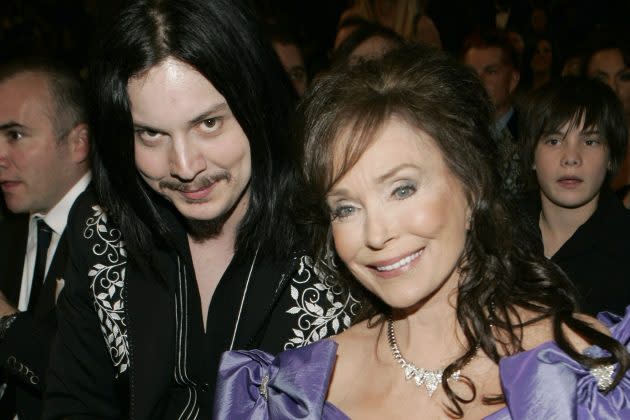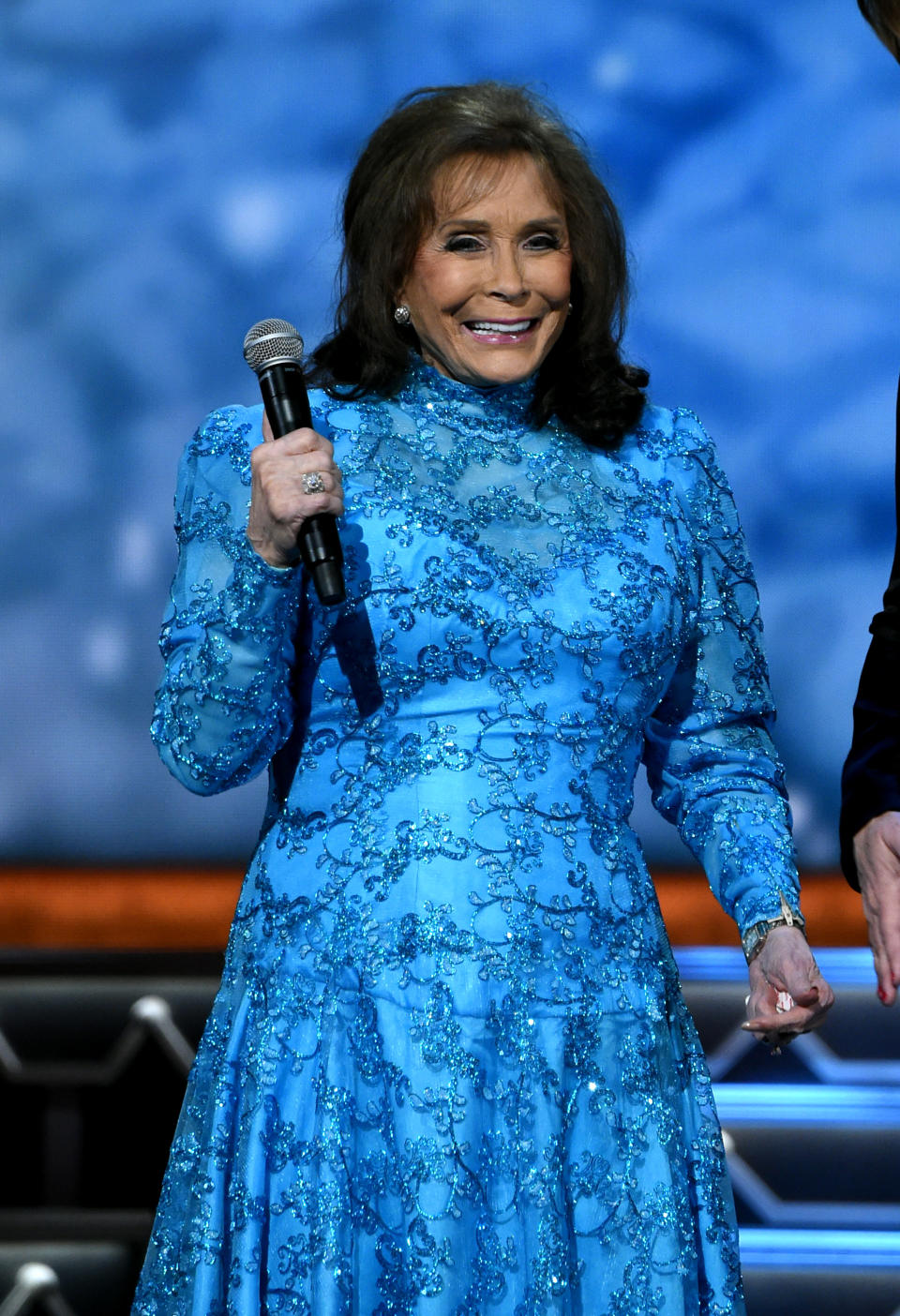Loretta Lynn, in Memoriam: Manager Tells How the Star Captivated New Generations of Fans, With a Little Help From Jack White
- Oops!Something went wrong.Please try again later.
- Oops!Something went wrong.Please try again later.
- Oops!Something went wrong.Please try again later.
- Oops!Something went wrong.Please try again later.

Nancy Russell worked in the music industry in Nashville for decades and was the manager to stars including Alan Jackson, Trisha Yearwood and — at the time of her Grammy-winning early 2000s comeback with “Van Lear Rose” — the late, great Loretta Lynn. Russell now lives in Southern California, consulting on independent music projects while focusing on screenwriting. She shared her memories of Lynn with Variety.
The first time I saw Loretta Lynn in person was at the Del Mar Fairgrounds in 1986, about a year before I moved to Nashville. Dressed in bright turquoise spandex and a white blouse, she sang her hits with warmth and spirit, committing to every single member of that audience. Never could I imagine that 15 years later I’d have the privilege to be her manager.
More from Variety
We will never see another “girl singer” (as she called herself) and songwriter like her. She kept writing till the end and had endless notebooks of lyrics, including stacks of them stored under an old tanning bed in her home.
She had an exceptional way of setting people at ease, whether on stage or backstage, making each one feel special. I’ve seen countless folks, from all walks of life, bask in the glow of her attention. While most artists rode in unmarked tour buses, Loretta insisted her name was displayed. Her late husband, Doo, had advised that “free advertising” also brought visitors to the vehicle. But she loved her fans like she did her family. And she sure did love her family.
In 2003, Loretta was a Kennedy Center honoree, so we made our way up to the White House. Never one to mince words, she told President George W. Bush he was “lucky to have Colin Powell around here to help you run things.” Minutes later, on an elevator, she and fellow honoree James Brown decided they were going to tour together. Next, at the cocktail reception, a smitten Donald Rumsfeld stood three feet from Loretta, staring and not saying a word. His wife whispered to me that he’d been in love with Loretta for as long as she could remember.
He wasn’t the only one. With her high, defined cheekbones, beguiling blue eyes and irresistible smile, Loretta was a stunning beauty well into her years. I remember that after a “60 Minutes” shoot, a captivated Mike Wallace lagged behind the crew, to escort her on a leisurely stroll of her Hurricane Mills homestead.
Introducing Loretta to Jack White and being a part of making the “Van Lear Rose” album remains one of the highlights of my career and my life. After Loretta agreed to try a couple of demos with Jack at Eric McConnell’s home studio in East Nashville, she and Jack dove in right away, producing what is now considered a masterpiece. Working with White introduced Loretta to a new generation and revitalized her career. I don’t think there’s anyone who could have done a better job producing her for that album than Jack. With the enormous respect he held for Loretta he tenderly guided every single note, chord, vocal and nuance during the recording, mixing and mastering of the album. He was a genuine fan.
On a break while sitting out on McConnell’s old wood front porch one afternoon, Loretta and I shared a can of beer — the only time I ever saw her drink. (And by that, I mean she had a few sips.) She told me and her daughter, Patsy, that this was the way she recorded in the early days and she loved it. It lit a spark in her. She even said she wanted to go out “honky tonkin’,” starting at Tootsie’s. We never did do that, but it was something she talked about us doing for years. I think just talking about doing it was fun for her and she didn’t need to actually carry it out.
As difficult as it is to imagine now, Nashville record labels had dropped iconic artists in the years preceding “Van Lear Rose,” including Tammy Wynette, Johnny Cash and others. Loretta, too, was without a record deal. As manager for Alan Jackson and Trisha Yearwood, I was dialed into the Nashville establishment and felt confident we would get a record deal locally. That confidence dimmed as we were rejected one by one, so I turned my sights to New York and L.A. Fortunately, Interscope’s Paul Kremen and I went to see Jimmy Iovine, and he loved it. Loretta would be back with Universal after many years, where her entire MCA catalog was, and where she wanted to be. It hurt that the country music world ignored the record at award shows and radio, yet Loretta went on to win two Grammys in the country category, something that had eluded her ever since a 1971 duet with Conway Twitty. (Since then, I think country music has tried to make it up to her, care of numerous tributes and honors.)
Beyond the genius body of music she leaves us is the sense that she was actually, always, one of us. She wrote and sang exactly what she thought. She understood the challenges of life and love, especially for women. She was our voice. After all, if Loretta could come from those humble beginnings and make a good life for herself with the difficulties she faced, couldn’t we too?
Of course, her music was for everyone, and her wisdom was often wrapped in wit. I remember when author Odie Lindsey visited the bus, as Loretta got her hair done for a show. She turned and asked him how he felt about going bald, finally concluding, “Honey, there wasn’t but one of us made perfect, and they hung him on a cross!”
Perhaps my favorite memory is when I was driving her around Memphis. She looked out the window naming all the various weeds along the roadside. She shared how they would pick them and her “Mommy” prepared them for supper. We talked then about how my biological mother was born in a rural part of eastern Kentucky, not too far from Butcher Holler. While I never thought of Loretta as a mother figure — more of a friend — she embodied the origins of my own mother, who had died at age 30, leaving me orphaned at six. Like Loretta, my mother was also an artist, painter and sculptor. While Loretta was the daughter of a coal miner, my mother was the daughter of a moonshiner. Both women had moved to the state of Washington early in their lives. Telling Loretta this, she said, “Nancy, honey, I always knew we were kin.” That will forever stay close to my heart.
It was the honor of my life to work with Loretta and I’m grateful to have called her my friend.

Best of Variety
Constance Wu Gets Candid in Revealing New Memoir 'Making a Scene'
The Best Pop Culture Halloween Costumes for 2022: From 'House of the Dragon' to 'Euphoria'
Sign up for Variety’s Newsletter. For the latest news, follow us on Facebook, Twitter, and Instagram.

